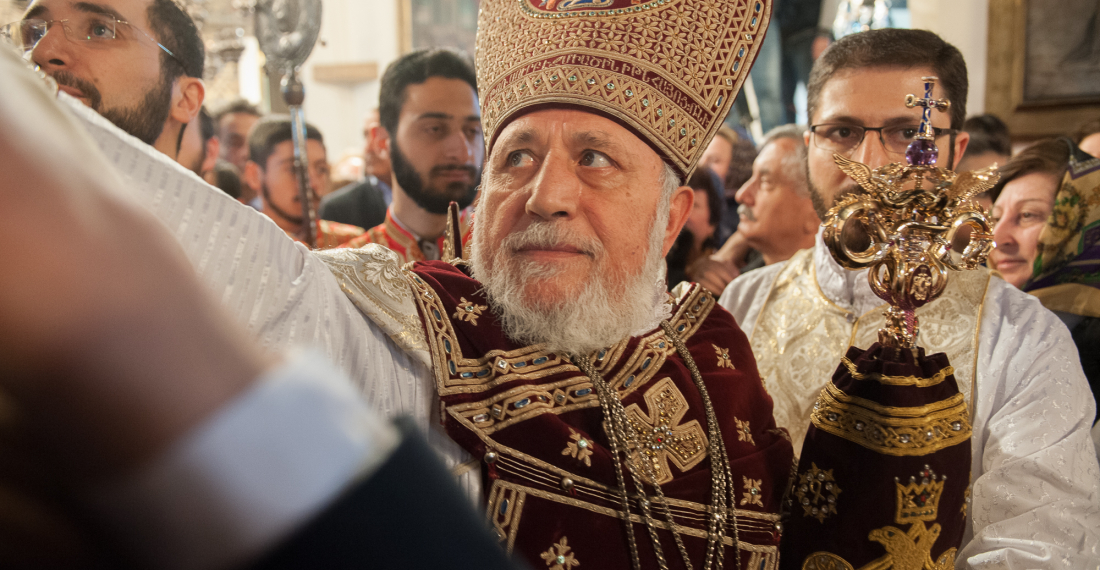Armenia finds itself in deepening discord between its political and religious elites. Prime Minister Nikol Pashinyan’s unprecedented public attacks on Catholicos Karekin II, head of the Armenian Apostolic Church, mark further escalation in a personal feud waged since the 2018 Velvet Revolution. It has worsened each year since, and not least since Karekin II approved the participation of his own clergy to join protests against Pashinyan in 2022 and for one to lead them in 2024.
The prime minister accused the Catholicos of violating his vow of celibacy and fathering a child, allegations that surfaced in the media over a decade ago but have now resurfaced with much sharper rhetoric. Pashinyan’s wife, Anna Hakobyan, even compared clergy to pedophiles, a provocative charge that many believe is intended to silence dissent ahead of a possible peace agreement with Azerbaijan and parliamentary elections set for next year.
This time, the Church and opposition groups are fighting back. Though the Catholicos has still not denied the charge, just as he remained silent when they last manifested themselves in 2013, his supporters continue to remain concerned that the reputation of the centuries-old religious institution could be damaged. Even most media neglect to mention that the claims did not first originate from Pashinyan, perhaps to make it seem as concocted spontaneously.
Nonetheless, it has added to divisions in the country. Calls for unity have grown louder, especially after war broke out between Israel and Iran, directly situated on Armenia’s southern-most border, earlier this month. Even then, Pashinyan only remained silent for four days. That brief pause ended when Russian-Armenian tycoon Samvel Karapetyan, who Forbes values at $4 billion, came to Karekin II’s defence, threatening unknown actions if the dispute isn’t resolved politically.
Pashinyan responded with more slurs online. The next day, after a failed National Security Service raid to detain Karapetyan, the agency’s head was dismissed. Karapetyan has since been accused of calling for the government’s overthrow and is in two-month pre-trial detention. Moscow, through Foreign Ministry spokeswoman Maria Zakharova, says it is closely monitoring events, while Russian media has harshly criticised Yerevan for its actions.
Archbishop Yezras Nersessyan, Karekin II’s brother, flew to Yerevan to support Karapetyan, further complicating the situation. Even Philipp Kirkorov, the well-known Bulgarian-born Russian pop singer of part ethnic Armenian descent, has voiced support for Karapetyan. It is worth noting that Karapetyan was reported to be among those that paid Kocharyan’s $4 million bail in 2020.
Pashinyan is now moving against Karapetyan’s business empire, including threatening to nationalise the Electricity Networks of Armenia (ENA) that the Russian-Armenian billionaire purchased from Russia’s Inter RAO in 2015. If successful, this could lessen Armenia's energy dependency on Moscow. Last year, one pro-Pashinyan analyst had already suggested nationalisation as a way to clutch the Russian-controlled Armenia-Iran gas pipeline away from Moscow.
Economists disagree, however, and have warned against doing so, citing the lack of an accommodating legal framework and that it could deter foreign investment. It could also end up bogged down for years in international arbitration, as other foreign-registered entities are also reportedly involved. Inspectors nonetheless closed some branches of Karapetyan's Tashir chain of pizza restaurants last week under the guise of routine health and safety inspections. Officials claim it is purely coincidental.
Though the government has alleged strong links between Etchmiadzin and Moscow in the past, the squabble ahead of next year’s parliamentary elections has taken on a more distinct and obvious geopolitical tone and should ring alarm bells. Yerevan had already accused Moscow of waging a hybrid war against it. If that was to escalate, then an already volatile situation could prove explosive, while Pashinyan instead eyes normalising ties with Azerbaijan and Turkiye as a potential vote winner.
Recent news that tech giant Nvidia plans to establish a $500 million AI Data Centre in Armenia could also help, though neither the company’s vice-president, Rev Lebaredian, and other wealthy diaspora Armenians behind the project such as Noubar Afeyan, have yet to provide any details of when it will materialise – or how it will be powered. The planned European Political Community (EPC) summit set for Armenia just weeks before the June 2026 elections will benefit him too.
For now, at least on the streets, there does not appear to be much public outrage over the latest spat with the church. That seems most visible among the opposition and other political activists. Despite claims to the contrary, most reactions to Pashinyan’s almost daily tirades on social media are supportive. However, once the dust settles, it would be better to avoid any further unnecessary risks along the way to what is shaping up to likely prove at least as acrimonious a vote as in 2008.
There is still only a little less than a full year until election day. Meanwhile, another major conflict, this time between Iran and Israel, has emerged on the border of Armenia and Azerbaijan, adding even more geopolitical uncertainty into the mix. The coming year was, anyway unpredictable. It is even more so now.






